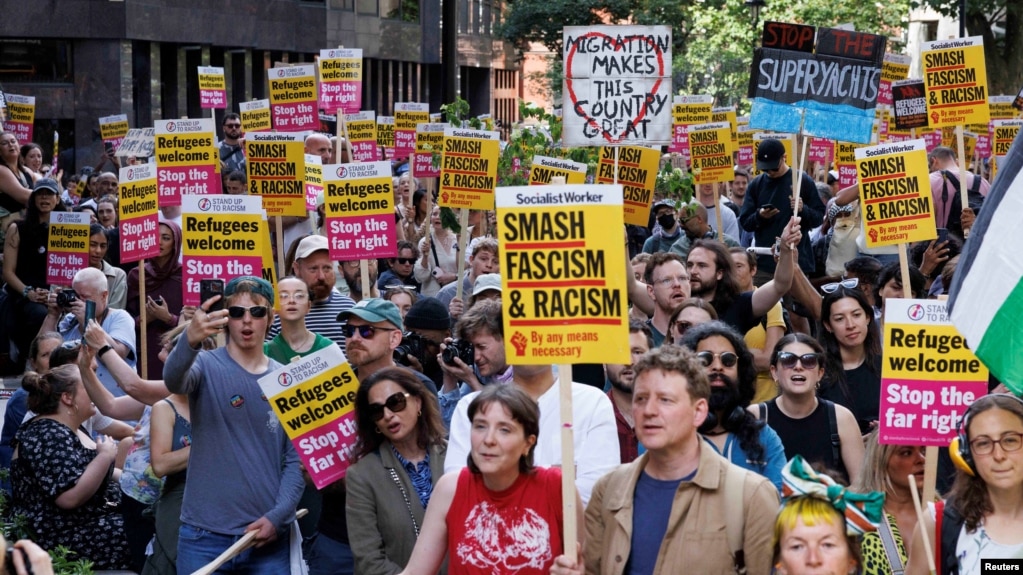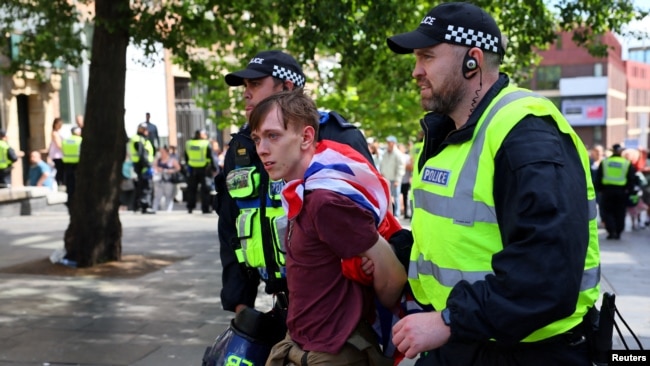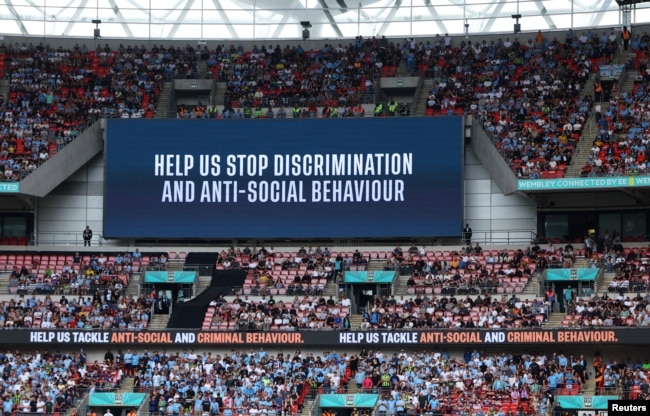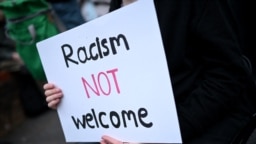August 14, 2024
By Henry Ridgwell
VOA

People hold signs at a protest against racism outside Reform UK's headquarters in Westminster, in London, Aug. 10, 2024.
British authorities are trying to ascertain the origins of the violent far-right protests that erupted in towns and cities across the country in recent weeks. While some blame simple racism and false news posted on social media, others say deeper social forces are at play – and warn that the government faces significant challenges in trying to prevent further unrest.
Who’s to blame for Britain’s far-right riots?
As the debate rages over the possible root causes of the riots, the initial trigger for the violence is undisputed. On July 29, a teenager with a knife attacked several children attending a dance class in Southport near Liverpool, resulting in the deaths of three girls, ages 6, 7 and 9.
False reports initially posted by an obscure crime website called Channel3 Now, wrongly identified the killer as a Muslim asylum seeker who had arrived on a small boat. The false news spread quickly on social media.
There was initial speculation that the Russian state was behind the disinformation. An analysis by the BBC, however, suggested that Channel3 Now had purchased an existing YouTube channel based in Russia to gain subscribers, but no link with Russian authorities has so far been identified.
Britain has accused hostile foreign states, including Russia, of amplifying misinformation in the days following the Southport attack.
Police later named the Southport suspect as 18-year-old Axel Muganwa Rudakubana, who was 17 when the attack took place. Rudakubana was born in Britain to Rwandan parents.
The role of social media is now in sharp focus.
“The initial violence was kicked off by a falsehood. To an extent, I think it’s fair enough to blame social media,” said Anand Menon, a professor of international politics at Kings College London.
The riots began the day following the Southport knife attack, July 30, as far-right protesters attacked a nearby mosque. Dozens of police officers were injured and a police van was set on fire.
The violence spread to other cities across Britain in the following days.

An anti-immigration protester is detained by police officers, in Newcastle, Britain, Aug. 10, 2024
Shops were looted and public buildings set on fire. Businesses owned by people of color were targeted. Mosques were attacked amid a wave of anti-Muslim violence. Hotels purportedly housing asylum seekers were set alight.
Immigration – and especially the influx of asylum seekers in small boats across the English Channel – appears to have been a driving force behind the riots. Forty-one-year-old mother Karina, who did not want to give her family name, was among those attending a far-right protest in the city of Nottingham.
“We want to see an end to people coming over illegally on boats from safe countries,” she told Agence France-Presse.
More than 1,000 people have been arrested since the violence erupted.
Many observers see deeper social divisions driving the violence.
“These are tensions that you see in a lot of countries right now – I would include the U..S to some extent in that, too – where you have emerging feelings of nationalism, a sense that people are being left behind, a sense that people's freedoms are being denied, the sovereignty of the nation is at stake,” Stephanie Alice Baker, a sociologist at City, University of London, told The Associated Press.
“And a lot of this really coincides with a rise of immigration and a cost-of-living crisis. So, people have these first-hand experiences of grievances, and a lot of these negative feelings are projected onto an 'other,’” she said.
Critics accused some right-wing politicians – especially Nigel Farage, the leader of the anti-immigration Reform party – of fanning the violence. On his YouTube channel, Farage has previously publicized the location of hotels that purportedly house asylum seekers. He has also accused British police of operating a so-called “two-tier” system where right-wing protesters are dealt with more harshly than other groups, although he has not provided any evidence. British authorities strongly deny the accusation.
A large demonstration was held Sunday outside the Reform party headquarters in London.
Farage has strongly denied inciting the riots.
“At no point in the last week or in the previous 30 years have I ever encouraged the use of violence, have I ever encouraged the use of anti-democratic means,” he told LBC News on August 6.

An anti-discrimination message is shown on a big screen at London's Wembley Stadium during a soccer match between Manchester United and Manchester City on Aug. 10, 2024.
The riots pose a challenge for Britain’s politics, said analyst Anand Menon.
“I think it’s a problem when political figures come very close, as some of them have, to actually justifying violence. On the other hand, I think if you get something like this it would be strange if you weren’t to think about the kind of causes that lead people to feel so angry that they’re able to contemplate this sort of thing,” he told VOA.
Far larger demonstrations against the far right have dominated towns and cities across Britain in recent days. A significant increase in policing and widespread arrests have also stymied the far-right protests.

British police, prepared for far-right agitators, find peaceful anti-racism protesters instead
Justice has been swift. More than 1,000 people have been arrested and hundreds convicted of offenses linked to the riots. The youngest was 12 years old; the oldest, 69. Scores of people have been charged with offenses relating to posts on social media, even though they may not have taken part in the violence.
Elon Musk, the owner of the social media site X, has faced criticism for allowing such posts to be published. He has himself posted in apparent support of the far-right protests, writing that “civil war is inevitable” in Britain. That prompted fury from many British lawmakers.
The riots pose the first big test for Prime Minister Keir Starmer, whose Labour Party won the July 4 election by a landslide.
“In relation to online and social media, the first thing I'd say is this is not a law free zone, and I think that's clear from the prosecutions and sentencing. … That's a reminder to everyone that whether you're directly involved or whether you're remotely involved, you're culpable and you will be put before the courts if you've broken the law,” Starmer told reporters on August 9.
“I do agree that we're going to have to look more broadly at social media after this disorder. But the focus at the moment has to be on dealing with the disorder and making sure that our communities are safe and secure.”
The unrest poses a longer-term challenge, said Anand Menon, professor of European Politics and Foreign Affairs at King's College London in the UK and has been serving as director of the UK in a Changing Europe initiative after his appointment in 2014.
“The UK has, over the last 10 to 15 years, had very low economic growth and hasn’t done much for many people who are struggling economically,” Menon told VOA. “And while that isn’t to justify the violence in any way, shape or form, I think it is absolutely appropriate to think, given what’s happened – are there circumstances that make people feel so desperate that they are more prone to this than others?”
No comments:
Post a Comment